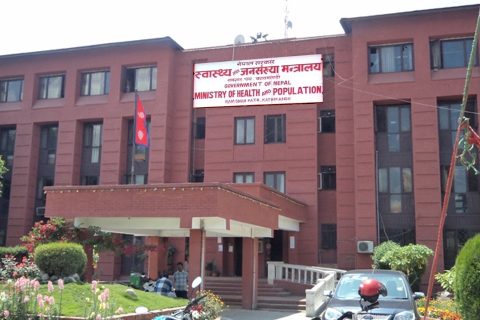Best Khabar Team | २०७६ मंशिर २९ गते आइतबार
Ravi Dhungel

Nepal has seen a paradigm shift in social, economic and political sectors in the last decade. As one of the oldest nations in the region transitioning to the newest republic, people’s movement and republic centric ideas have been thrust to the center stage. Nepal has also made remarkable progress in adopting information and communication technologies. While the digital divide has been narrowing, there still exists barriers for marginalised, low income and less educated population to participate in the globalisation trends.
Today, more than nine million people use social media. The country has more than 1.3 times the population of mobile communication subscriptions. Huge amounts of citizen data that influence public policy, academic research, intellectual property, politics, military, and financial data are shared on the internet. Managing, monitoring, and securing digital data is a daunting task to the government, private and public entities.
This astounding amount of digital data, if leveraged well, can empower law enforcement and government line agencies for planning, intelligence and operations. Unfortunately, it also makes cyberspace a new battleground for adversaries. The digital transformation is also helping businesses to innovate and secure intellectual property and citizen data for privacy. The increasing dependence of our life in technology is one of the most serious national security challenges of the 21st century. Data from government and private sector networks are being exploited at an unprecedented scale by a growing array of state and non-state actors. This is a new challenge for national security both in developing and developed nations to mitigate cyber security challenges for unintended ways.
A resilient cyberspace is required for our daily life, economic vitality, and national security. Developing resilience for national security requires strategic, operational, and tactical forms of cyber security.
In the US and other developing countries, one of the biggest challenges of national security is cyber security. It can impact the fabric of democracy with information propaganda to influence elections and billions of data sets are shared with criminals on the dark web with state and non-state actors. Today, cyber security has been recognised as a critical component of national security.
For instance, the United States Army recognises cyberspace as the most important battle space after land, water, and sea. Multiple state agencies that includes civilian agencies like the Department of Homeland Security are responsible for cyber security. General David Petraeus, former CIA director and four star General, believes that countries like Nepal should invest in developing their national cyber security infrastructure. “Cyber threat looks similar across the world and a nation should recognise the cyberspace as an important battle space and critical part of national security,” he adds.
Developing a resilient national cyber security requires a strategic shift in national security policy. Protection of critical digital infrastructures– banks, power-grids, telecom infrastructures, and airports– need to be guarded like physical security. A national cyber security centre should be established that should act as a hub for threat intel and defensive and offensive security to mitigate cyber threats. There are huge policy and technical deficits in cyber security. The policies governing data protection, privacy, intellectual property, cyber crime, and cyber terrorism should be developed and revised in legislative bodies.
The recent cases of information system breaches in the banks in Nepal highlight the challenge of securing critical infrastructure and the importance of having a national policy of cyber security. The US state department’s recent findings on Nepal’s border data management practices accentuates the importance of cyber security to curb terrorism nationally and internationally.
Nepal being in the geographic middle of two of the most populous countries is susceptible to being caught up in a cyber-battle with both state and non-state actors. Having strong cyber security preparedness will help Nepal be well prepared, not only to mitigate the threats in cyberspace but also challenges in border and physical security. Data is required for meaningful actions and to ensure the integrity, confidentiality, and availability of data, banking cyber security in national security policy is a must.
(Dhungel is a global cyber security practitioner based in USA and a former Major of Nepal Army. He is the Chief Information Security Officer at www.esrtech.io and can be reached at ravi@esrtech.io.) This article is taken from The Rising Nepal. )
 स्पेन र पोर्चुगलमा अप्रत्यासितरुपमा विद्युत् कटौती, जनजीवन कष्टकर, रेल तथा हवाईसेवा प्रभावित
स्पेन र पोर्चुगलमा अप्रत्यासितरुपमा विद्युत् कटौती, जनजीवन कष्टकर, रेल तथा हवाईसेवा प्रभावित
२०८२ बैशाख १५ गते सोमबार
२८ अप्रिल, २०२५सेन्जेन, लक्जम्बर्ग । युरोपेली मुलुक स्पेन र...
 संसदीय चुनाव पर्यवेक्षणका लागि काँग्रेस उपसभापति निधी कोपहेगनमा
संसदीय चुनाव पर्यवेक्षणका लागि काँग्रेस उपसभापति निधी कोपहेगनमा
२०७६ जेठ २० गते सोमबार
०३ जुन, २०१९ कोपनहेगन/डेनमार्कमा हुन लागेको आसन्न संसदीय चुनावको...
 काठमाडौंको ग्राण्डी अस्पतालका कर्मचारीसहित थप ३२ मा कोरोना
काठमाडौंको ग्राण्डी अस्पतालका कर्मचारीसहित थप ३२ मा कोरोना
२०७७ जेठ १० गते शनिबार
२३ मे, २०२०काठमाडौं । काठमाडौंको टोखा नगरपालिकामा रहेको ग्राण्डी...
 २४ घण्टामा देशभर १५० कोरोना संक्रमित थपिए
२४ घण्टामा देशभर १५० कोरोना संक्रमित थपिए
२०७७ श्रावण ६ गते मंगलबार
२१ जुलाई, २०२०काठमाडौं । पछिल्लो २४ घण्टामा देशभर थप...
 काजकिस्तानमा उडिरहेको विमान घरमाथि बज्रँदा १४ को ज्यान गयो
काजकिस्तानमा उडिरहेको विमान घरमाथि बज्रँदा १४ को ज्यान गयो
२०७६ पुष ११ गते शुक्रबार
२७ डिसेम्बर, २०१९नूरसुल्तान । काजकिस्तानमा आज भएको यात्रुबाहक विमान...
Top